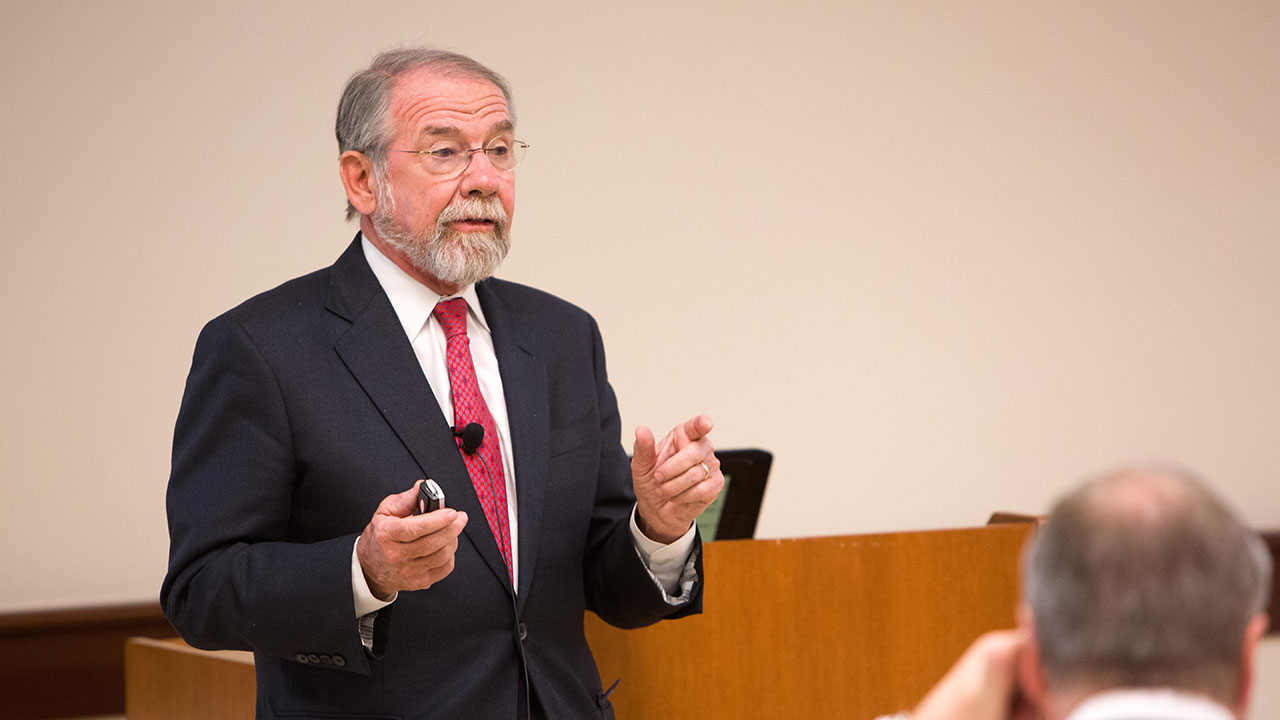[box]Dr. George Thibault, president of the Josiah Macy Jr. Foundation, discusses health care education at Quinnipiac University’s Center for Medicine, Nursing and Health Sciences in North Haven. (Mark Stanczak, Quinnipiac University).[/box]
Dr. George Thibault, president of the Josiah Macy Jr. Foundation, visited Quinnipiac University’s Center for Medicine, Nursing and Health Sciences on March 5 to discuss the education of health professionals and the foundation’s mission to improve the health of the public.
Thibault presented the lecture, “Innovations in Medical Education: Aligning Education with the Needs of the Public,” to about 50 faculty and staff members, including Kim Hartmann, interim dean of the School of Health Sciences, Bruce Koeppen, dean of the Frank H. Netter MD School of Medicine, and Jean Lange, dean of the School of Nursing.
“Dr. Thibault is one of the nation’s thought leaders on interprofessional education,” Koeppen said. “We are honored that he has taken some time to share his expertise and insights with us as we work together to implement innovative approaches to medical education to serve the needs of the public.”
Thibault, who spent almost four decades in leadership positions at Harvard Medical School, became president of the Josiah Macy Jr. Foundation in 2008. Named in memory of the prominent philanthropist, the foundation is the only national organization solely dedicated to improving the education of health professionals. The foundation’s guiding principle is that health professional education has at its core a strong social mission, which is to serve the public’s need and improve the health of the public.
Thibault outlined six areas of innovation for health professions education: interprofessional and interdisciplinary education; new models of clinical education; new content to complement the biological sciences; competency-based education; incorporation of new educational and information technologies; and increased efficiency and individualization of education.
“We are arguing for a much more united health care delivery system and education system,” Thibault told the Quinnipiac group. “I think you are in a position to help bring that about by your outreach to the community and by discussions about a distributed model of education that will more closely link the educational process with an evolving and changing delivery process.”
Thibault said that innovations in health professions education and the future of health care are inextricably linked and that innovations are needed to better align education with the needs of the public. He also said that closer links are needed between education and health care delivery.
While admitting that “all of this will require culture change,” Thibault said that Quinnipiac, with its new Frank H. Netter MD School of Medicine, is in position to lead the way. One goal of the school is for its medical students to be part of a learning environment where they will interact with students from the School of Health Sciences and School of Nursing to learn to become effective members of a primary health care team.
“What we do really matters,” Thibault said. “It should matter. It better matter. You can be a model for other medical schools. We all know that the established institutions are the ones that have the hardest time changing. The new and up-and-coming institutions can be and should be models that others will follow. I feel that sense of spirit here. You’ve got a great opportunity here and I know you’re going to seize the moment.”
